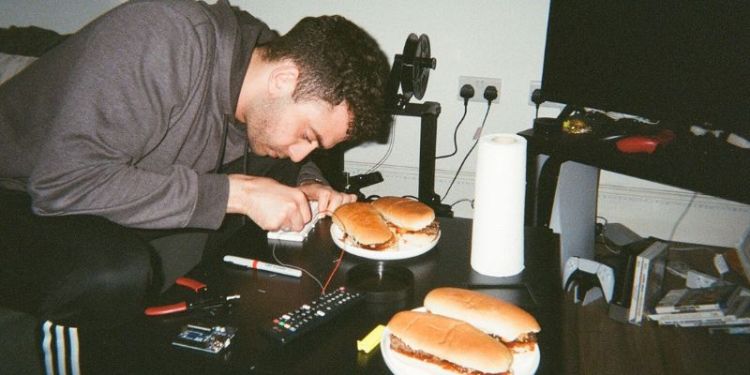
Ryan Jamal
- Course: Mechatronics and Robotics MEng, BEng
As an international student, Ryan Jamal had a strong idea of what he wanted to study – but not where he wanted to study it. His research into UK universities quickly revealed the University of Leeds as an ideal place to study Mechatronics and Robotics.
“After coming across the University of Leeds, it didn’t take long until I was confident it would be my 1st choice”, said Ryan. “Not only was UoL one of the first Universities to offer the new Mechatronics & Robotics degree, but they did so under their Parent-School of Electronic and Electrical Engineering, which in turn was one of the Top 5 schools within their field in the country.
“This early-yet-pristine adoption of new technology made it clear that if I wished to be at the forefront of the Robotics revolution, the University of Leeds was the place to go.”
Solving Practical Problems
Ryan’s time on the Mechatronics and Robotics course has helped him to take on a wide variety of real-life challenges. He said: “The best aspect of my course is by far the focus on practical work. Of course, learning theoretical concepts is an essential part of becoming a competent engineer, as it ensures you lay the necessary foundation upon which to build your technical skills. However, as any engineer worth his money will tell you, practical work holds key lessons which can never be taught through a textbook.
“Whether it’s the never-ending list of hardware limitations, communication challenges that come with working in a larger team or simply a faulty wiring connection – hands-on experience requires you to develop vital skills that would otherwise go unrealized.
In the world of engineering, it is precisely these skills that differentiate the good from the great. Hence the long list of remarkable alumni that have emerged from this course.”

Overcoming fears
Starting university can be daunting for anyone for a myriad of reasons, Ryan’s anxiety stemmed from the complexity of industry-standard engineering projects. He said “Coding projects with thousands of lines, circuit boards with thousands of components and mechanical designs backed up by thousands of calculations. The scope was daunting. I was steadfast convinced I would never (or at least not within the next 140 years) get to a stage where I had a confident understanding of any projects with such a massive scope. Thankfully, I was wrong.”
Like all fears, taking to time to think about them and working on them with the help of others can allow you to overcome them. Ryan took the time to think about the basis for his anxiety and how he could overcome it, he said: “One of the pivotal concepts taught by the University is the idea of modularity. In essence, modularity entails breaking a larger problem into smaller challenges, which in turn get further deconstructed into even smaller tasks. In the end, you end up with a collection of small, ‘bite-sized’ problems. Modules, if you will. Each of which is comparatively trivial to solve. Once each problem is solved, the modules are ‘plugged’ back together, either conceptually or literally, and you end up with a grand-scale, complex product. Just like that, what would once fill you with fear and dread from the sheer scope of the project, is now designed and manufactured before your very eyes. Exhilarating.
The understanding of this principle is a crucial prerequisite to becoming a masterful engineer. I believe, that until you’ve truly grasped the notion of modularity, you cannot attain true confidence as an engineer.
With this in mind, it becomes self-evident why the University persistently finds itself at the forefront of technological research and entrepreneurial ventures. The ‘modular framework’ is promoted and encouraged on virtually all projects you’re given. From day one, you will be taught how to systematically approach problems of any nature, break them down into their key parts and tackle each sub-part accordingly. You are taught how to be extensive and creative in your pursuit of solutions, promoting not only quality but brilliant innovation. By the end of the course, you will have gained the confidence to take on any challenge that excites you and to do so with the knowledge that you have what it takes to succeed at the highest level. Not a bad mentality to start your career with, to say the least.”
In addition, one unexpected aspect of attending university for Ryan was the importance of his physical health. He said “Before coming to university, I cared little about eating a healthy diet, exercising, or sleeping well. However, during my course, I learnt first-hand that I needed to improve all these aspects of my life if I wanted to achieve the marks I aimed for.
As an engineering student, you’ll be finding yourself sitting in front of a screen for the majority of the day. If you don’t exercise or put in extra measures in place to compensate for the prolonged sitting, you’ll run the risk of developing avoidable health issues at a young age.”
Working on Exciting Projects
In addition to standard degree activities, the University gave students like Ryan other opportunities. “During the summer of 2022, I partook in one of the University’s Engineering & Physical Sciences (EPS) 8-week long summer internships,” he said.
“My task was to develop circuits that could convert a given input voltage to a controlled output voltage, as well as measurement circuits that could measure both current and voltage levels.
“The internships are designed to provide the student with practical engineering experience, but to do so in a safe and supporting environment. The primary goal is for the student to develop both their soft and technical skills. As such, the EPS summer internships exposes you to the unique problems that come with practical engineering work, while still making sure you feel comfortable to experiment with the project and make valuable mistakes.
“After a successful summer internship, I presented my results in the University’s annual Undergraduate Research Conference (UGRC). There, I got to learn about a vast field of interesting projects completed by other undergraduates at the university. I got to network with like-minded students, all of whom came together to celebrate the ground-breaking research conducted by the University.”

Industry placement
Having chosen to study Mechatronics and Robotics at Leeds, the course gives the option to either undertake a study abroad or a year in industry. Ryan chose the latter and is currently working as an energy data analyst.
“My job entails bringing in data from our clients about their energy consumption and energy production. The consumption is done in their facilities, mainly supermarkets and stores, and the production is done on their solar panel sites. Through the use of Python scripts and spreadsheets, I analyse where they overconsume energy and where their production is sub-par, then report any findings back to the clients for further fixing.
This placement opportunity is my first exposure to a 40-hour work week, with a lot of independence within said hours. So far, I’ve found that one of the key skills that supports my productivity is time management. Due to the independent nature of the tasks, I need to ensure I prioritise tasks correctly and allocate sufficient time to complete all my daily objectives. Working in a relatively small team also means I’m given a lot of responsibility, as falling short on completing the tasks can set the entire team back. Nevertheless, the experience I garnered through university-based opportunities such as volunteering as a course representative, working in Leeds Student Formula, and completing my summer internship has provided me with the skills I need to handle the tasks at hand.
Completing a placement year has an extensive list of benefits to it, including giving you an insight into what field you want to work within as well as exposure to how to operate at a professional level. With brilliant organisations such as the Engineering and Physical Sciences Employability Team available to guide you through all stages of the application process, landing a placement becomes an attainable yet invaluable experience to develop yourself purposefully.”
Living in Leeds
To Ryan, the best characteristic of Leeds is that virtually everything you need is within walking distance. He explained: “Whether it’s walking to university, your local supermarket, the nearest gym or your favourite club, chances are the journey will take you no more than 20 minutes. This makes Leeds a haven for students, who often don’t have a car at their disposal. Even if the destination is slightly further away, the expansive public transportation network allows you to easily take a cheap bus or Uber to where you want to go.
Furthermore, the city is dense with unique and thrilling places to explore. Anything from jazz bars to book clubs, climbing halls to retro pubs, kickboxing gyms to idyllic parks – if you can imagine it, Leeds has it. Couple that with the fact that Leeds has one of the largest student populations in the UK, and you end up with a city that guarantees you’ll find a place where you belong. No matter how niche or mainstream your interests are, there’s a society for it. The density of the city is also perfect for whenever you feel adventurous and want to explore a new hobby, as one step into the city centre will grant you any society you can imagine within a short walking distance.

Student accommodation
Ryan lived in student accommodation during his first year at university. He said: “Being an international student, I had already been stressed enough about applying to a course in a foreign country and learning how the systems worked. Being able to find accommodation through the University, as opposed to the conventional yet challenging process of finding it privately, helped alleviate a lot of the stresses I was feeling at the time. When you apply for student accommodation, you can rest assured that you’ll have all the facilities you need to live comfortably, while you’re still settling into a new country.
I was lucky and ended up with three other international students. Not only did we have a friend group from day one, but we had each other for support when we came across problems we were facing. Coming to the UK was a thrilling experience, however at times, I would feel overwhelmed, as I was all alone in a foreign place. However, knowing I had three flatmates who were going through the same challenges as me, reminded me I wasn’t alone. If I ever felt uncertain about something, I could talk to them, and we would find solutions together.”
He continued, “On that note, I recommend to all international students that when you arrive, find a group of people who are in the same boat as you. Even if they’re not your flatmates, having conversations with someone who relates to your unique challenges as an international student can transform your perspective on embracing a new culture. Yet another reason to apply to student accommodations, which are often filled with international students, all excited to explore a new country and meet people from all parts of the world.”
Life outside the classroom
During his second year, Ryan volunteered as an electrical engineer for the Leeds Student Formula team. He said: “This was my first exposure to circuit board designing and prototyping. I spent months learning how to use specialised software to simulate the functionality of a circuit, as well as design parts of the circuit in CAD software. I don’t believe I would’ve gotten the summer internship I eventually got, if it weren’t for the skills I picked up in Leeds Student Formula.
I also volunteered as a course representative. My tasks included reporting student feedback to professors, conducting surveys, attending meetings with other course representatives and University staff, and promote any announcements given by the university to the cohort. As course representative, I honed both my time-management skills and communication skills, as I needed to communicate effectively with different people.”
Looking to the future
Ryan has big dreams after his studies are completed. “Once I finish graduating, I plan to embark on entrepreneurial ventures,” he said. “Studying mechatronics and robotics has provided me with the skills I need to partake in the pending technological revolution that surrounds artificial intelligence and robotics. The potential for successful start-ups is endless, and the market is still mostly untapped. I see this as the perfect climate to take the entrepreneurial route.
“The main advice I would give to any student studying my course is take any opportunity thrown your way. Mechatronics and robotics is a vast field, and as such, having a broad range of experience provides you with a better perspective on what the field entails.
“Whether it’s volunteering to the Leeds Student Formula team, joining your engineering society as a committee member, signing up to work as a course representative, or applying for summer internships. Laying a broad foundation of experience ensures you become a well-rounded and skilful engineer. If you ever see an opportunity, take it.”
Find out more
Discover more about our Undergraduate degree courses in the School of Electronic and Electrical Engineering.

